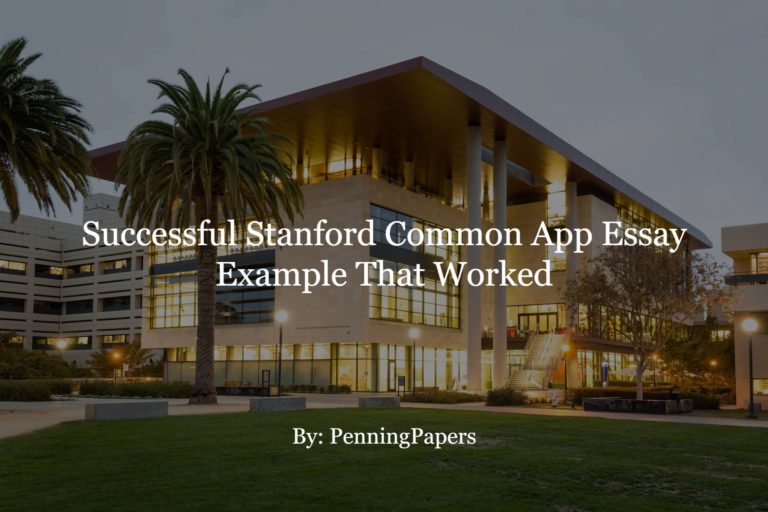A few months back, we had a client from Charlotte, NC.
Their story was not all that different from what you’ve probably heard: ambitious, young, hard-working, and with a whole life ahead of them.
They also had a fantastic GPA, a very high SAT score, and many extracurriculars behind them.
In other words…
They were one of many students applying to T25 schools.
Yup. That’s right.
Although perfect grades, test scores, and extracurriculars make you a smart student, they don’t help you stand out when applying for the top 25 schools in the nation.
So, our student was understandably quite nervous about their chances of getting accepted into a decent school.
In fact, Stanford wasn’t really even originally on their list of intended colleges to apply for! Instead, they were primarily aiming for NYU’s Stern program for business. Originally, our client was wary of whether they should truly apply for Stanford. But, after a few conversations (including a discussion on hedging college admissions risk, which you can find more about in our article here) we managed to convince them to apply for Stanford.
And, as you may have already guessed from the title of this article, they got in!
In this article, we’ll be covering this exact essay. In particular, we’ll be dissecting the essay and what made it successful; and, we’ll show how you can use these elements to create a successful Stanford essay.
Table of Contents
Professional College Application Help.
Contact us. We'll get to you within 24 hours.
Successful Common App Stanford Essay Worked.

“Charlotte, NC.
White picket fences. American flags. Girls giggling about something. And, of course, “boys being boys” —connotation varying depending on whether the Panthers or the Hornets won that season. It’s the same everlasting charm of North Carolina.
There’s an underbelly. It’s not physical; but, it certainly feels that way. I can’t articulate it in one fell swoop of intellectual conciseness. But, I can show it.
My scoutmaster, upon discovering his son was gay, disowned him and hasn’t seen him since. Now, in his late fifties, when the ceremonial lighting is just right, I see the wrinkles on his face twisted from nights of grief and mourning for his son. That overwhelming prideful shame carved his face. Even during those ceremonies when he exclaims how proud he is, we know he wishes his son were on that stage.
My business: [Redacted]. Despite how fulfilling a challenge it is, I’ve seen the self-improvement industry subtly denigrate one’s confidence. It’s ironic. The stronger I see influencers get, the weaker they feel. The bigger they get, the smaller they feel. The more they lift, the heavier their internal load.
I do believe I can explain it: North Carolina’s underbelly of boys being boys and anti-homosexual boyscout rituals and powerlifting… things.
As a boy, a man, an Asian man living in a conventionally masculine community, it’s an unending internal scream. Why a scream? Well, what other way is there to communicate when no one will listen?
It’s the feeling that something —some abstract problem too difficult to define— is wrong about the way we think about masculinity.
It’s that feeling of trying to speak up for once about how tiring it is to act out manliness only for other men, women, their brothers, and their sisters to sweep it under the perfect “welcome” rug and say, “well, y’know; that’s just how them boys are…” or “you’re just insecure” or, if they may be so facetious as to use this excuse, “we don’t talk about them negative stuff in the house of God.”
The very word “masculinity” can’t be introduced into polite conversation without resurrecting the exhumed cacophony of horrible emotional reactions. Husbands getting angry. Wives sweeping under rugs. Daughters feeling threatened. And… of course, boys being boys.
One must curse, or scream, upon hearing the word escape through uncomfortably pressed lips. But, I can’t scream. No one can. We may only let our yearning screams for acceptance, validation, frustration, fear, insecurity, and every spectrum of human experience boil within each muscle fiber of our being.
If there’s one thing I’ve learned through my years of having to be smart enough as an Asian male, big and “natural enough” as a powerlifter, cool enough, and all the enoughs, it’s that my soul internally yearns to be treated as an individual with a beating heart. I’m not numbers on a chart, or stats on a sheet.
Yet, fighting this dehumanization taught me how to be human again: by sacrificing my intrinsic desire for men to be… anything. True masculinity transcends societal “oughts” and “shoulds”. So, I lifted without the expectation of getting bigger. I accepted if friends wanted to split bills. I demonstrated vulnerability and emotional openness.
And, well, it was hard.
Letting go of toxic masculinity in a patriarchal white community was brutal. My peers in Charlotte all agreed that, “We need to smash the patriarchy! You go girl… er, bro.”
But, when I do exactly that, my community’s patriarchal head would rear once more. “Find the most obtuse and inefficient methodology!” “Lift heavier weights than reasonably manageable!”
It’s not perfect; but, it’s a journey. It’s the Asian male journey through a white picket fence community where the American flags wave and the girls giggle about stuff and the Panthers must defeat the Hornets and where, one day, hopefully, the boys can truly —in the most genuine and meaningful sense— be boys.“
Successful Stanford Essay That Worked
What Made Our Stanford Essay Example Successful?

There are many elements that made our Stanford essay example work. But, for the sake of clarity, we’re going to be focusing on just these five elements.
- Imagery
- Flow
- Opening up with vulnerability
- Morality
- Being subtle with bragging
If you implement these 5 factors into your Stanford essay, you will have a MUCH STRONGER essay than what most other people are writing.
Now, you may be thinking: Aren’t other people going to be writing at a very high level too? So, I’ll just be average, right?
We’re going to be transparent here and say that most people who come to us here at PenningPapers DON’T have good Stanford essays.
That’s right.
Most of the Stanford Common App essays are actually rather average at best, and mediocre at worst. That DOESN’T mean these writers are not smart. In fact, we’ve had plenty of both lower and higher-performing students.
The real problem is that MOST students don’t know how to write college essays.
And, you may even be one of those people. Just because you were in AP Lang and Lit does not guarantee that you’ll have what it takes to write a strong and compelling Stanford Common App essay that would help you stand out from the rest.
It’s a harsh truth; but, it’s a truth nonetheless!
But, on the bright side, that means implementing these 5 points will help boost the quality of your Stanford Common App essays by a lot!
Of course, if you feel that you still need help standing out from the rest of the Stanford admissions pool, fret not. Schedule a free consultation with us, and we’ll get back to you within 24 hours! Our expert college admissions essay editors and consultants will help you craft a powerful Stanford essay alongside you that will blow the rest of the admissions pool out of the waters (no pun intended).
1. Imagery, Imagery, and Imagery.

There is great power that comes with imagery.
Before we dissect this idea, let’s show you an example.
The first passage contains a description of the fear that comes with perfectionism. The second passage covers the same topic but with imagery involved.
“I’m quite a perfectionist. But, this is not always a good thing. As a perfectionist, I cannot accept less-than-ideal quality in my work. I can only be satisfied with work when it is perfect. So, this gives me less confidence. And, it has made much of my experience growing up very difficult. It translates into much of my everyday life outside of academics such as soccer, piano, and even hangouts with friends.”
Bad Example of Imagery
“It has to be just right: or else, it’s just right.
Those who know the difference know the difference.
Others… well, perhaps I can articulate it in the best way possible.
To put it simply, I’m a perfectionist. I’ve been told by many, and I’m sure you’ve heard something similar, that my perfectionism is a gift of personality and something that would drive me toward success. It hangs a glimmering carrot over my head; but, that’s the thing. That’s all it does.
Perfectionism dangles. It just dangles a glowing carrot over my head, never to be reached.
But, perfectionism should lead to success, no?
No. It doesn’t
Perfectionism is the opposite of success. It’s truly, in the realest sense, a curse. To seek perfection is to reach for stars that don’t exist. It’s to move the goalposts at the last second knowing your perfect kick should have landed.
It’s never good enough. It never is. And, even if it were, it didn’t count.
For instance, despite achieving the highest possible scores allowed in my courses, I can never truly process the positive emotion that should ensue from said accomplishments. I could have finished the test faster than Josie. I could have spent less time on a question than Antonio. I could have expended fewer brain cells than Brayden.
It’s an impossible goal: to be satisfied. It’s a neverending thirst for water that would never arrive because my mind, at the very core of it, at its truest, deepest roots, truly, is afraid of accepting that I may be ‘okay’. That I am satisfactory. That I am ‘just right.’
Good Example of Imagery
The goal of imagery in your college essay is not just to make things pretty (although, pretty words are quite nice!) It’s also for communicating difficult and abstract feelings in a manner that outsiders understand.
This is why imagery is so important in your college essay: your experiences are unique to you and only you. So, imagery can give your readers the empathy needed to fully articulate your unique experiences they may otherwise be ignorant of.
For instance, you may have experienced the struggles of facing bigotry as a lesbian woman. But, admissions officers may not truly understand the struggles that come with living life as a lesbian. If your imagery is strong enough and you have the right combination of words and emotional appeal, you can help them experience and therefore understand what you feel.
In turn, this makes you a more compelling candidate since readers can better articulate your character and why it fits their school!
It’s up to you and your imagery to craft the best string of words that portray your experiences in a manner such that outsiders can understand your struggle better.
2. The Power of Flow. (Don’t be Choppy.)

Perhaps equally important to imagery is flow.
Flow is the streamlined reading experience from one idea to another. It’s the transition between ideas that should be read easily and without having the admissions officer reread your paragraphs carefully in order to conceptualize your ideas.
Often, transition words, conversational tone, and diversity of sentence structure are going to be your best friends.
Here’s an example:
“My scoutmaster, upon discovering his son was gay, disowned him and hasn’t seen him since. Now, in his late fifties, when the ceremonial lighting is just right, I see the wrinkles on his face twisted from nights of grief and mourning for his son. That overwhelming prideful shame carved his face. Even during those ceremonies when he exclaims how proud he is, we know he wishes his son were on that stage.”
Example of Flow
In this paragraph, we vary how we use commas. Some separate independent and dependent clauses, while at other times we’ve used them as appositives.
In addition, we’ve ensured that the topic does not jump dramatically from one thing to another. We try to stick this paragraph to being solely about the scoutmaster and their experience of having disowned their son for being gay.
Notice how we don’t start talking about the overall NC community or other examples of toxic masculinity. This paragraph is focused primarily on the scoutmaster; and, any divergence from the main topic incites either a transitional phrase or the start of a new paragraph.
3. The Importance of Vulnerability.

In your college essays, not just the Stanford Common App essay, you’re going to want to show your vulnerable side.
This doesn’t mean you need to open up about your favorite color, favorite food, and the color of your underwear. What we mean by vulnerability is the demonstration of human imperfection in the face of a critical eye: in this case, the judgment of Stanford’s admissions officers.
Specifically, we would like you to demonstrate a more human side to you that may even be considered a weakness to admissions officers. Now, this can be seen as quite awkward and unusual. Why would anyone want to openly admit to weakness when applying for as prestigious a school as Stanford?
Well, it’s actually quite simple!
Who do you trust more?
- The person who appears perfect in every way whether it includes grades, test scores, hobbies, and personality.
- The person who demonstrates humility through both their strengths and weaknesses?
This question is like asking whether Instagram models are realistic representations of beauty. They’re not trustworthy! In the same way, people who ONLY show their beautiful sides often have a lot of skeletons in the closet.
How many fun nights out have you had to let go for those grades?
How many people did you have to step over in order to land such a prestigious position in your club?
What kind of privileges were you afforded to be able to get your SAT score from an 1100 to a 1550? (hint: it’s often tutoring)
If you want to show admissions officers that you’re someone who can be trustworthy, you need to be able to open up about some of your weaknesses in one way or another. Sometimes, the best Stanford essay examples are the ones that are unafraid of opening up about some mistakes.
In our example Stanford Common App essay we showed how our client was someone who lived in a community mired in toxic masculinity. Yet, their attempts at going against the grain are not met with flying colors. In fact, it’s filled with adversity.
“If there’s one thing I’ve learned through my years of having to be smart enough as an Asian male, big and “natural enough” as a powerlifter, cool enough, and all the enoughs, it’s that my soul internally yearns to be treated as an individual with a beating heart. I’m not numbers on a chart, or stats on a sheet…
…And, well, it was hard.”
Example of Vulnerability
You can’t exactly just tell people that you “just stopped giving in to the patriarchy bro!” You also can’t just tell admissions officers that you lost 50 pounds of adipose tissue whilst gaining 40 pounds of lean muscle mass through just “working hard, bro!”
It’s unbelievable. And, more importantly, you’d be raising more eyebrows at your fairy tale success than you would be making people believe you.
That’s why, vulnerability works. Vulnerability is weakness; and, weakness is a reality no one can escape from no matter how smart you are. Being realistic in the college admissions process helps make students infinitely more believable and trustworthy.
And, if admissions officers can trust you due to your openness and openness to vulnerability, they can believe the other great positive sides to you without having to second guess what you say.
This brings us to the next section!
4. Showing Your Moral Side.

Most students have a moral compass.
Some students are focused on environmental disasters. Others are concerned about animal rights. Some focus on financial inequality. Others are focused on women’s liberation.
Whatsoever your moral side is, it’s quite useful to share with Stanford where your morality stands.
You don’t need to save the koalas, bring humanity to Mars, solve world hunger, and fix every world problem in one go. Instead, you need only share, whether as a main topic or subtly woven in between the lines, what your moral alignment is.
In this case, our client struggled and persevered against the forces of toxic masculinity. It wasn’t always easy, and they had the humility to admit that. But, it’s clear from this essay that they care very much about the mental health and well-being of young men.
One tip we would suggest when writing your Stanford Common App essay is to focus on one hyper-specific niche of your moral compass. So, if you’re passionate about helping the environment, it can be very helpful to focus on the preservation of wood and lumber for future generations and its impact on the woodworking industry. If you’re passionate about women’s rights, you may want to focus on a narrow niche like representative law for women’s rights in the workplace.
5. Demonstrating Your Strong Side… Subtly.

When writing the Stanford Common App essay, you’ll obviously want to show your strong side.
But, be subtle.
You don’t want to be the loudest person in the room waving their flag of virtue, high marks, and strong test scores. You certainly don’t want to be the biggest braggart in the admissions pile. It’s an easy way to provide admissions officers with all the fodder they need to reject you from Stanford.
Instead, be gentle and subtle with how you communicate your words.
We recommend weaving your strengths into your essay rather than writing about what makes you strong directly. In other words, show don’t tell!
Here’s an example of subtly demonstrating your strong side in our Stanford Common App essay example.
“It’s not perfect; but, it’s a journey. It’s the Asian male journey through a white picket fence community where the American flags wave and the girls giggle about stuff and the Panthers must defeat the Hornets and where, one day, hopefully, the boys can truly —in the most genuine and meaningful sense— be boys.”
Example of subtley showing your strong side
In this paragraph, we normally could have concluded the essay by showing that the Asian male journey was one of struggle and perseverance. We could have just said that our client had faith that things would be better. But, we didn’t
Instead of just saying they had faith, we wanted to demonstrate the faith in an otherwise hopeless community by once again harkening to the quintessential atomic family elements which so constitute toxic masculinity. Then, concluding the paragraph with a more positive spin on the original toxic “boys will be boys.”
By creatively weaving in our client’s faith in an otherwise patriarchal society that has not changed from its cliquey American white-picket fence culture, we show admissions officers that our client is positive, hopeful, and willing to pursue the greater good despite the overwhelming odds against them.
There’s little to no chance a community described like it was in the essay could possibly turn into a more accepting community. Yet, our client concludes such a dreary description with optimism. And, that would speak more about our client’s character than any direct telling possibly can.
If you’re still struggling to write a solid Stanford Common App essay, feel free to contact us for a free consultation. Our expert college admissions essay editors and consultants have helped students like you get accepted not just into Stanford, but into other prestigious universities such as USC, UCB, NYU, Dartmouth, UPenn, Brown, Harvey Mudd, and many others.

